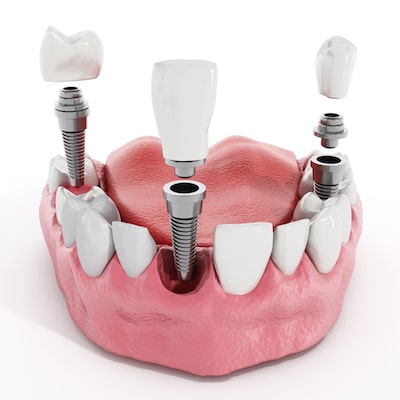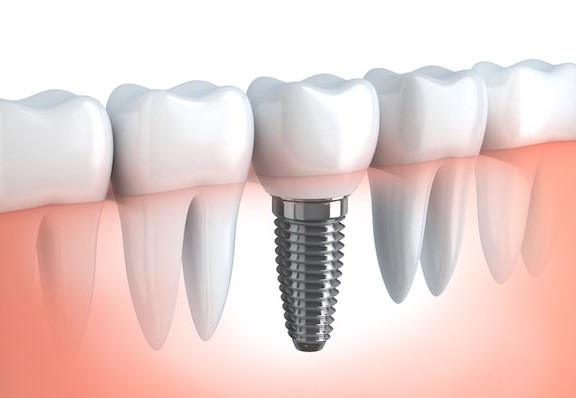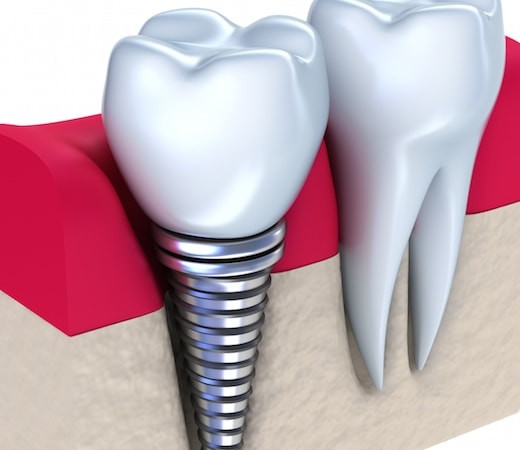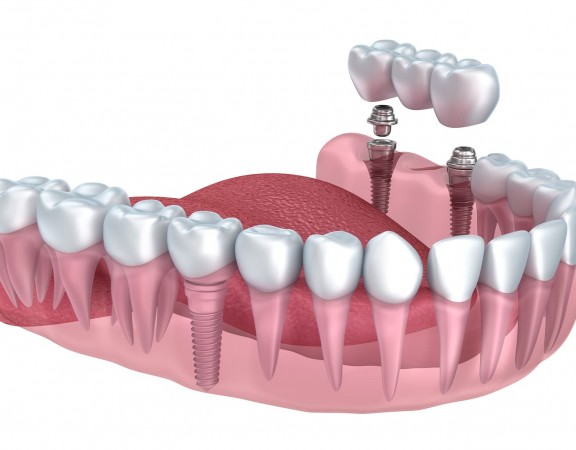If you have a missing tooth, a dental implant might be the solution you need to provide an improved look to your mouth. A dental implant is a dental restoration that is essentially a small screw that is inserted into the jawbone. The screw, which is made of titanium, is inserted so it acts like the root of a missing tooth. The dental crown that will be placed in the mouth is attached to the top part of the dental implant so, when they are combined, they are the equivalent of a tooth. The dental implant attaches to the jawbone, so it provides the necessary amount of stability and support for the dental crown (and, on occasion, dentures, or a fixed bridge).
Dental Implants – How They are Placed in the Mouth
 The first step in having dental implants placed in the mouth is having your mouth examined by a dentist. The examination, including X-rays, is necessary in order to determine the current condition of the teeth as well as to devise an individualized treatment plan.
The first step in having dental implants placed in the mouth is having your mouth examined by a dentist. The examination, including X-rays, is necessary in order to determine the current condition of the teeth as well as to devise an individualized treatment plan.
On the day of the treatment, there might be a need to extract the tooth if it is still located in the area that will be treated. Once the tooth is no longer in the treated area, the dentist will drill a hole in the jawbone so the dental implant can be put in place.
As the jawbone continues to heal, it will also fuse with the dental implant to provide the needed stability for the rest of the treatment. Once the dental implant is sufficiently stable, an abutment is placed on top of it and this abutment works as a connector to the crown. The abutment is also tightened into place and then the crown is attached to the abutment.
Dental Implants – Are You an Ideal Candidate?
You might be a good candidate for this cosmetic dentistry treatment if you are missing one, or multiple, teeth due to tooth decay or an accident or congenital dental issue. You will also need to have gums that are in good health along with a sufficient amount of bone in the targeted area of the mouth to support the dental implant.
Dental Implants Advantages
The biggest advantage of dental implants, as opposed to dentures or dental bridges, is that the implant is anchored to the jawbone, so it enjoys a greater deal of stability in the mouth. In general, they are easier to clean and maintain than dentures and bridges. However, dental implants do require you to have a surgical procedure as opposed to these other options. In addition, dental implants are able to maintain the integrity of the bone in the mouth.
Dental Implants – Recovery and Results
If you decide to have dental implants placed in the mouth, there is not much to expect in the way of downtime. There will be some pain from the procedure that will resolve on its own in addition to any swelling and bleeding that will also resolve over time.
Once the dental implant is placed in the targeted section of the mouth, the results will be seen immediately. The placement of the implants can last for around a decade as long as you maintain them through the performance of proper oral health. They do not decay like natural teeth, but their longevity can be negatively impacted by gum disease. Be sure and brush your teeth at least twice per day and also use mouthwash and dental floss on a regular basis.
In addition to the pain, bleeding, and swelling mentioned above, there are other risks involved with having dental implants placed in the mouth. These risks include a possible infection in the treated area, the implant breaking or chipping at some point, and the failure of the implant to properly fuse with the jawbone in order to stay in place.
Dental Implants – Information to Help You Make a Decision
The loss of a tooth is a very common oral health issue and dental implants give you the chance to replace a missing tooth with a solution that functions like a normal tooth. In addition, dental implants also look and feel like a natural tooth.
If you are not willing to have oral surgery, you are not going to be able to enjoy the improvements provided by dental implants. You also need to have realistic expectations when it comes to the length of the results, and you need to be an ideal patient to receive dental implants. Keep in mind that you might not be able to have dental
implants placed in the mouth if you are suffering from active gum disease or you do not have a sufficient amount of bone structure in your mouth.
If you have any additional questions or concerns, write them down and take them with you to your consultation appointment so you can have them addressed and answered by the doctor.






